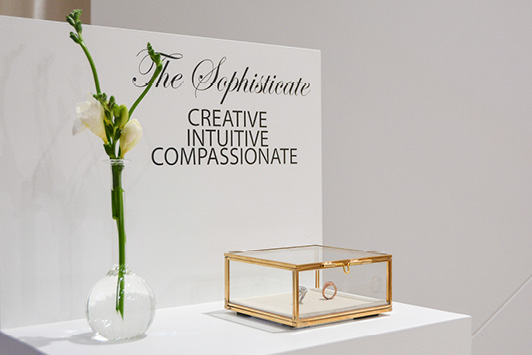
There’s a heartbreaking story about Frances Gerety, the N.W. Ayer & Son copywriter who wrote the “A Diamond Is Forever” tagline for De Beers.
In 1963, a number of agency executives were invited to Johannesburg to celebrate the 25th anniversary of the enormously successful De Beers diamond-marketing campaign. Gerety’s bosses all came back to the New York office flaunting the shiny gold watches they had been gifted. She looked around, incredulous: Where’s mine?
No one had thought to honor her contribution. The diamond world was a boys’ club, plain and simple.
But finally, more than 50 years later, it’s working to effect lasting and positive change. This fall, De Beers announced a number of important initiatives, all aimed at encouraging gender inclusivity and promoting positive messages about women.
From reexamining their own corporate policies and prejudices, to investing money in women’s education, to overhauling their longstanding marketing message, executives at De Beers and at its retail brand Forevermark are challenging themselves to reform the industry in a way that is unequivocally pro-woman.
A ‘Tribute’ to women “I think this does come from our recognition that we are selling a woman’s product,” says Charles Stanley, a 20-year veteran of the diamond world and president of Forevermark.
He describes the “three pillars” of this commitment, designed to support the advancement of women in all of the De Beers diamond-producing countries (Botswana, Canada, Namibia and South Africa) and beyond. For Forevermark, this means a new collection, called Tribute, and an innovative campaign to go with it. The first television spot, set to a surprisingly lyrical version of Fatboy Slim’s late-’90s hit “Praise You,” retains the warmth and the romance of traditional diamond advertising while paying homage to women’s inimitable spirit.
“Tribute is about celebrating women for what they are, not what they do,” explains Kristen Lawler-Trustey, PR manager at Forevermark. “It’s easy to fall into the trap of thanking women for what they do — cooking, cleaning, raising children — but the emphasis is shifting.”
Advertising has a powerful impact on culture: Just this past July, Britain’s Advertising Standards Authority announced it would be developing new guidelines to combat gender stereotyping in advertising. But for Forevermark, changing its outward-facing messaging is just smart business, especially at a time when “feminism” and “equality” have become buzzwords.
Without the other initiatives, the brand’s effort to stay “culturally in-tune,” as Stanley puts it, might simply be regarded as shrewd. However, De Beers is putting its money where its mouth is, pledging $3 million to support women-owned microenterprises in African diamond-producing countries, and partnering with UN Women and Ontario’s University of Waterloo to provide scholarships to underprivileged Canadian women interested in pursuing STEM subjects. These efforts are designed to cultivate the female leaders of tomorrow.
“The mining industry generally has been quite a male-dominated industry,” says Katie Fergusson, head of social impact at De Beers. “The large majority of roles are technical, and there hasn’t been such a strong pipeline of women being attracted to those roles.”
Abolishing the boys’ club By investing in women’s education, De Beers is hoping to fix the imbalance. As a company, it’s also taking steps to improve its corporate culture, so that De Beers not only attracts female talent, but retains it.
This is crucial, says Lori Nishiura Mackenzie, executive director at the Clayman Institute for Gender Research at Stanford University.
“A diversity goal should be coupled with goals to change the culture. Otherwise you can have a revolving door — increasing the number of women hires and then seeing them leave,” she adds. To that end, De Beers has formed an “across-pipeline working group,” in Fergusson’s words, to understand the key issues. The company has brought in third-party experts to conduct focus groups and to lead unconscious bias training, which Fergusson says has provided existing De Beers executives and senior employees with a “safe space” to explore their own underlying perceptions about gender, as well as their questions and concerns.
With the company’s multipronged approach, De Beers and Forevermark have the potential to abolish the boys’ club atmosphere once and for all. The key to this, according to Tammy Hughes at the Heim Group LLC — a consultant group devoted to identifying and solving gender-related issues — is appreciating that men and women might work differently, but no approach is better or worse. “You need to create a climate that understands and values the differences... If an organization doesn’t do this well, one gender will feel targeted or diminished. And, in our experience, it’s always best to start this learning at the top,” she says.
Image: Forevermark's Tribute collection launch in New York in November 2017Article from the Rapaport Magazine - December 2017. To subscribe click here.